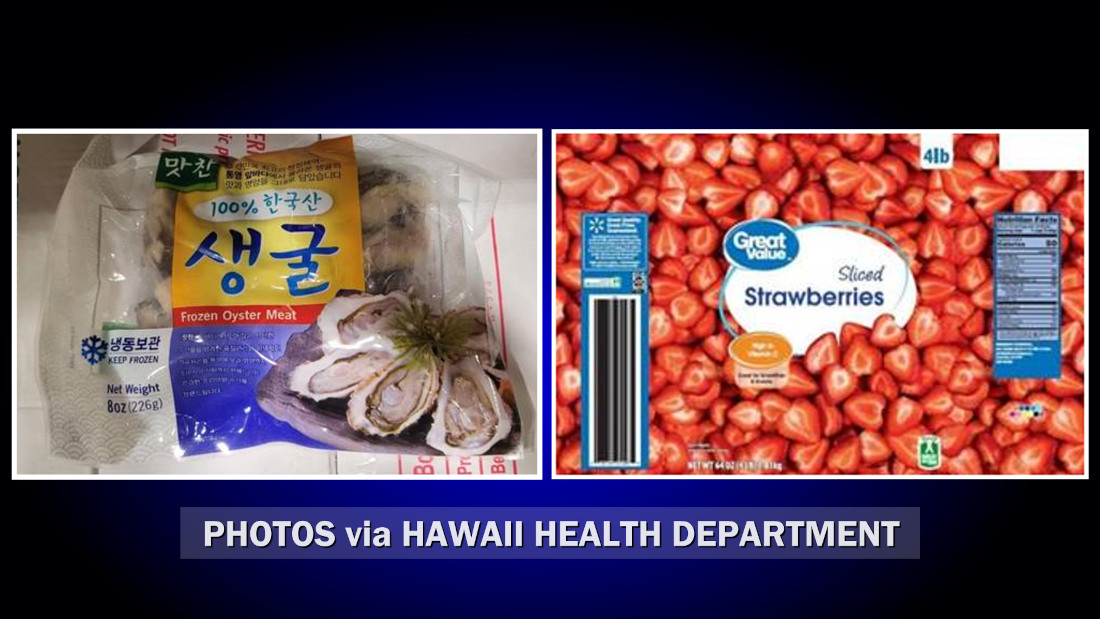(BIVN) – The Hawaiʻi Department of Health on Friday issued a warning for consumers of certain raw oyster and frozen fruit products that have been voluntarily recalled due to the possibility that they may be contaminated.
Frist, this DOH alert about raw oysters potentially contaminated with norovirus:
The Hawai‘i Department of Health (DOH) Food Safety Branch is issuing an alert regarding raw oysters exported from Dai One Food Co., Ltd., Republic of Korea (ROK), which may be potentially contaminated with norovirus.
DOH notified the United States Food and Drug Administration (FDA) of five illnesses from individuals who consumed raw oyster shooters at a restaurant in Hawai‘i on May 10, 2023. Trace-back information revealed the source for the implicated raw oysters was from a shipment by Dai One Food Co., Ltd., ROK. Samples collected were sent to the FDA to be tested for the presence of norovirus. The FDA released its findings on June 12, 2023, confirming that norovirus GII was detected in one of the two samples collected.
Dai One Food Co. Ltd. has voluntarily recalled Individual Quick Freezing (IQF) raw oysters, harvested between February 2 and 4, 2022 and April 13 and 14, 2022, that were shipped from the ROK and distributed to restaurants and retailers in Hawai‘i, Georgia and Minnesota. The lot numbers affected are: D021031, D021041, and D020481.
Norovirus can cause a sporadic gastroenteritis in populations ranging from children to the elderly. The infections are more frequent in children under age 5 than in adults. The most-common symptoms of norovirus are diarrhea, vomiting, nausea, and stomach pain. Other symptoms include fever, headache, and body ache. Most people infected with norovirus begin to develop symptoms 12 to 48 hours after infection. Symptoms usually last one to four days.
Consumers, especially those who are or could become pregnant, the elderly, and persons with weakened immune systems, who have recently consumed raw oysters and suspect they have food poisoning, should seek medical care immediately.
“Restaurants and retailers should not sell the potentially affected raw oysters,” health officials stated. “Restaurants, retailers and consumers should dispose of any products by throwing them in the garbage or returning to their retailer or distributor for destruction. Restaurants, retailers and consumers should also be aware that the oysters may be a source of pathogens and should control the potential for cross–contamination of food processing equipment and the food processing environment.”
DOH says consumers of oysters should follow the steps below:
- Wash hands with warm water and soap following the cleaning and sanitation process.
- Retailers, restaurants, and other food service operators who have processed and packaged any potentially contaminated products need to be concerned about cross-contamination of cutting surfaces and utensils through contact with the potentially contaminated products.
- Retailers that have sold bulk product should clean and sanitize the containers used to hold the product.
- Regular frequent cleaning and sanitizing of food contact surfaces and utensils used in food preparation may help to minimize the likelihood of cross–contamination.
The Department of Health is also warning about frozen fruit products due to potential hepatitis A contamination:
The Hawai‘i State Department of Health (DOH) Food and Drug Branch is warning residents of a voluntary recall by Willamette Valley Fruit Co. of the following Great Value frozen fruit products sold at Walmart, because of the potential presence of hepatitis A. All other types of Great Value frozen fruit products are not affected by this recall. The voluntary recall includes the following lot codes and dates:
Great Value Sliced Strawberries, 64oz (4lb) plastic bag with the following codes:
Lot: 4018305, Best By: 7/19/2024
Lot: 4019305, Best By: 7/20/2024Great Value Mixed Fruit, 64oz (4lb) plastic bag with the following codes:
Lot: 4024205, Best By: 7/25/2024
Lot: 4025305, Best By: 7/26/2024
Lot: 4032305, Best By: 8/2/2024
Lot: 4033305, Best By: 8/3/2024
Lot: 4034305, Best By: 8/4/2024
Lot: 4035305, Best By: 8/5/2024Great Value Antioxidant Fruit Blend, 40oz (2lb 8oz) plastic bag, with the following code:
Lot: 4032305, Best By: 8/2/2024
Customers are urged to check their freezers and throw away or return the recalled product for a refund. Customers with further questions about the products covered by this recall may contact Willamette Valley Fruit Co. at 1-800-518-9865.
Guidance from the U.S. Food and Drug Administration (FDA) warns that persons should not consume products contaminated with hepatitis A, a contagious virus that can cause liver disease. Hepatitis A virus infections can range from a mild illness lasting a few weeks to a serious illness lasting several months. Illness generally occurs within 15 to 50 days after eating or drinking contaminated food or water, and symptoms of infection include fatigue, nausea, vomiting, abdominal pain, jaundice, dark urine, and pale stool. In rare cases, particularly consumers with pre-existing severe illness or who are immune compromised, a hepatitis A infection can progress to liver failure.
Persons who may have consumed the affected product should consult with their health care professional to determine if vaccination is appropriate, and consumers with symptoms of hepatitis A should contact their health care professionals immediately.


by Big Island Video News4:16 pm
on at
STORY SUMMARY
HONOLULU, Hawaiʻi - The Hawaiʻi Department of Health says certain raw oysters may be contaminated with norovirus, and certain frozen fruit products could contain hepatitis A.